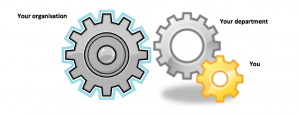SITHIND003 Use hospitality skills effectively
Note: This unit is similar in nature to SITHIND004 – Work effectively in hospitality
In this unit you will learn how to;
- Prepare for service
- Provide service
- Complete operational tasks
- Complete end of shift duties
Introduction
Hospitality is a dynamic and fast growing industry that offers many different career opportunities. You may work in sectors such as clubs, bars, hotels or restaurants and fulfil roles from wait staff to chef to senior management positions … and your work could take you to any part of the world.
Working in hospitality incorporates a range of work requirements that may include the preparation of work areas and food products, providing service, closedown of work areas as well as using a range of techniques, equipment and materials. It will involve taking responsibility for your own personal outputs, working as part of a team and taking limited responsibility for the work of others.
A somewhat busy and exciting industry, working in hospitality requires lots of energy, good communication and customer service skills. It may involve night and weekend work, however it can also provide opportunities to travel and meet new people.
Hospitality is an industry that requires passion and a willingness to provide quality service and to work effectively with others to ensure this happens.
Understanding your role within the organisation
No staff member in an organisation works in isolation; they must all work in cooperation with other team members and sections of the operation; for example Mis-en-Place MUST be completed on time to ensure food service progresses smoothly – this involves many different people. Each step in the process relies on others steps being completed to provide full service and this, as mentioned, takes careful planning and organisation. Like a well oiled machine each person functions like a cog in the process.

In addition to having a sound knowledge of the organisation’s policies and procedures, it is also important to understand the various job roles within the organisation – what are their various functions and responsibilities and who can you go to for help or advice when necessary.
A workplace team may be made up of many people and the hierarchy could be made up of many layers.
In the hierarchy shown below the company consists of the Managing Director, a layer of Directors, then layer of Middle Managers and Team Leaders and finally by the staff who are at the front line of the organisation
Each layer, within this hierarchy, will have specific functions and tasks to perform and, those lower down on the chart, will have reporting channels – senior staff to whom they are accountable. Functions of each position will vary between organisations and, in general, the larger the organisation the more layers of management there may be.
Briefly however;
- Managing Directors (or General Managers) of an organisation – will, among many other things, carry the overall responsibility for the organisation. They develop business plans and strategies, make all major decisions affecting the business and oversee the business affairs of the company as a whole. Managers, at this level, will normally only meet with the management level directly below them. This will, of course, depend very much on the size of the organisation – in a small to medium sized business the Managing Director would be much more accessible to all staff than in a large multi-national company.
- Department Managers will oversee the operations of their specific areas of the organisation. Based on the organisation’s overall goals and objectives, they may develop strategies and plans for their specific departments to ensure the overall goals are met, they will deal with all major issues of their departments and, in larger organisations, will meet with their supervisors or team leaders on a regular basis to ensure the department is functioning to the required standards and meeting targets.
- Supervisors or Team Leaders are generally responsible for ensuring that policies and procedures are implemented and that work is being carried out, by frontline staff under their control, to the required standards. They deal with the day to day running of their department or section and deal with all frontline staff issues and meet with their staff on a regular basis.
- Frontline staff carry out the day to day work that keep the organisation running – they serve customers, ensure that the premises are neat, clean and tidy and fulfil any other duties allocated to them, to the required levels. Staff who have concerns or who have feedback to provide should, in the first instance, discuss these issues with their supervisors or team leaders. Only in extreme circumstances should frontline staff go above their direct reporting channel to senior management.
Examples of front line staff roles include (but are not limited to):
- Floor staff (or front of house)- including waiting staff, bar attendants, glassies and floor supervisors, provide service of food and beverages to guests in a variety of environments such as cafés, restaurants, fine dining restaurants and bars.
- Kitchen – Dependent on the size of the kitchen and style of service will dictate the staff in the kitchen. Some examples may include- head chef, commis chef, sous-chef, saucier, patisserie, apprentices…continued in learner guide …
For purchase information go back to hospitality unit page
